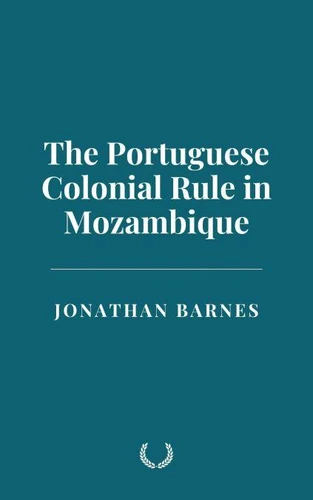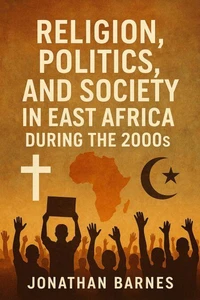The Portuguese Colonial Rule in Mozambique
Par :Formats :
Disponible dans votre compte client Decitre ou Furet du Nord dès validation de votre commande. Le format ePub est :
- Compatible avec une lecture sur My Vivlio (smartphone, tablette, ordinateur)
- Compatible avec une lecture sur liseuses Vivlio
- Pour les liseuses autres que Vivlio, vous devez utiliser le logiciel Adobe Digital Edition. Non compatible avec la lecture sur les liseuses Kindle, Remarkable et Sony
 , qui est-ce ?
, qui est-ce ?Notre partenaire de plateforme de lecture numérique où vous retrouverez l'ensemble de vos ebooks gratuitement
Pour en savoir plus sur nos ebooks, consultez notre aide en ligne ici
- FormatePub
- ISBN8230225737
- EAN9798230225737
- Date de parution22/01/2025
- Protection num.pas de protection
- Infos supplémentairesepub
- ÉditeurIndependently Published
Résumé
This book explores the complex and multifaceted history of Mozambique, with a particular focus on the period of Portuguese colonial rule, the struggle for independence, and the post-independence challenges faced by the nation. It provides an in-depth analysis of the social, political, and economic systems that shaped Mozambique during colonial times, examining the exploitation of labor, the impact of forced labor systems, the establishment of concessionary companies, and the cultural exchanges that took place under colonialism.
The narrative extends into the resistance movements and the formation of FRELIMO, the liberation movement that ultimately led the country to independence in 1975, analyzing both the internal and external factors that contributed to the struggle for national liberation. The book delves into the consequences of the Carnation Revolution in Portugal in 1974, which facilitated Mozambique's independence, and examines the early years of post-colonial governance under FRELIMO's socialist agenda.
It highlights the complexities of nation-building, the creation of a new national identity, the challenges of reconciliation, and the legacies of colonial divisions that persisted even after independence. Furthermore, the book considers the economic difficulties and social inequalities that FRELIMO faced in attempting to transform Mozambique's colonial economy, as well as the destructive civil war with RENAMO that lasted well into the 1990s.
Throughout, the book draws on primary sources, historical analysis, and the ideas of various scholars to offer a nuanced understanding of Mozambique's path from colonization to independence and its ongoing journey toward national unity and socio-economic development. The text reflects on the lasting effects of Portuguese colonialism on Mozambique's political, cultural, and economic landscapes and explores the efforts made by post-independence governments to overcome these challenges and build a new nation.
The narrative concludes by recognizing the resilience and determination of the Mozambican people in their ongoing struggle to create a just, equitable, and inclusive society.
The narrative extends into the resistance movements and the formation of FRELIMO, the liberation movement that ultimately led the country to independence in 1975, analyzing both the internal and external factors that contributed to the struggle for national liberation. The book delves into the consequences of the Carnation Revolution in Portugal in 1974, which facilitated Mozambique's independence, and examines the early years of post-colonial governance under FRELIMO's socialist agenda.
It highlights the complexities of nation-building, the creation of a new national identity, the challenges of reconciliation, and the legacies of colonial divisions that persisted even after independence. Furthermore, the book considers the economic difficulties and social inequalities that FRELIMO faced in attempting to transform Mozambique's colonial economy, as well as the destructive civil war with RENAMO that lasted well into the 1990s.
Throughout, the book draws on primary sources, historical analysis, and the ideas of various scholars to offer a nuanced understanding of Mozambique's path from colonization to independence and its ongoing journey toward national unity and socio-economic development. The text reflects on the lasting effects of Portuguese colonialism on Mozambique's political, cultural, and economic landscapes and explores the efforts made by post-independence governments to overcome these challenges and build a new nation.
The narrative concludes by recognizing the resilience and determination of the Mozambican people in their ongoing struggle to create a just, equitable, and inclusive society.
This book explores the complex and multifaceted history of Mozambique, with a particular focus on the period of Portuguese colonial rule, the struggle for independence, and the post-independence challenges faced by the nation. It provides an in-depth analysis of the social, political, and economic systems that shaped Mozambique during colonial times, examining the exploitation of labor, the impact of forced labor systems, the establishment of concessionary companies, and the cultural exchanges that took place under colonialism.
The narrative extends into the resistance movements and the formation of FRELIMO, the liberation movement that ultimately led the country to independence in 1975, analyzing both the internal and external factors that contributed to the struggle for national liberation. The book delves into the consequences of the Carnation Revolution in Portugal in 1974, which facilitated Mozambique's independence, and examines the early years of post-colonial governance under FRELIMO's socialist agenda.
It highlights the complexities of nation-building, the creation of a new national identity, the challenges of reconciliation, and the legacies of colonial divisions that persisted even after independence. Furthermore, the book considers the economic difficulties and social inequalities that FRELIMO faced in attempting to transform Mozambique's colonial economy, as well as the destructive civil war with RENAMO that lasted well into the 1990s.
Throughout, the book draws on primary sources, historical analysis, and the ideas of various scholars to offer a nuanced understanding of Mozambique's path from colonization to independence and its ongoing journey toward national unity and socio-economic development. The text reflects on the lasting effects of Portuguese colonialism on Mozambique's political, cultural, and economic landscapes and explores the efforts made by post-independence governments to overcome these challenges and build a new nation.
The narrative concludes by recognizing the resilience and determination of the Mozambican people in their ongoing struggle to create a just, equitable, and inclusive society.
The narrative extends into the resistance movements and the formation of FRELIMO, the liberation movement that ultimately led the country to independence in 1975, analyzing both the internal and external factors that contributed to the struggle for national liberation. The book delves into the consequences of the Carnation Revolution in Portugal in 1974, which facilitated Mozambique's independence, and examines the early years of post-colonial governance under FRELIMO's socialist agenda.
It highlights the complexities of nation-building, the creation of a new national identity, the challenges of reconciliation, and the legacies of colonial divisions that persisted even after independence. Furthermore, the book considers the economic difficulties and social inequalities that FRELIMO faced in attempting to transform Mozambique's colonial economy, as well as the destructive civil war with RENAMO that lasted well into the 1990s.
Throughout, the book draws on primary sources, historical analysis, and the ideas of various scholars to offer a nuanced understanding of Mozambique's path from colonization to independence and its ongoing journey toward national unity and socio-economic development. The text reflects on the lasting effects of Portuguese colonialism on Mozambique's political, cultural, and economic landscapes and explores the efforts made by post-independence governments to overcome these challenges and build a new nation.
The narrative concludes by recognizing the resilience and determination of the Mozambican people in their ongoing struggle to create a just, equitable, and inclusive society.

















